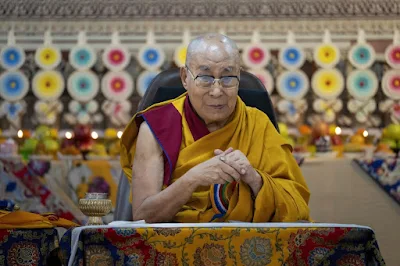The United States extended warm birthday wishes to His Holiness the Dalai Lama on Saturday, marking his 90th birthday with a renewed affirmation of support for the Tibetan people’s right to religious freedom—subtly signaling Washington’s ongoing concern over Chinese interference in Tibetan spiritual affairs.
In a statement released by the U.S. Department of State, Secretary of State Marco Rubio emphasized the Dalai Lama’s enduring global influence as a symbol of peace and compassion, while reiterating America’s commitment to human rights in the Tibet Autonomous Region.
"The United States extends best wishes to His Holiness the Dalai Lama on his 90th birthday," Secretary Rubio stated. "The Dalai Lama continues to inspire people around the world by embodying the values of unity, peace, and compassion."
Though not directly naming China, Rubio’s remarks carried a pointed diplomatic undertone. "The United States remains firmly committed to promoting respect for the human rights and fundamental freedoms of Tibetans," he added. "We support efforts to preserve Tibetans’ distinct linguistic, cultural, and religious heritage, including their ability to freely choose and venerate religious leaders without interference."
The statement appears to challenge Beijing’s long-standing position that the selection of the next Dalai Lama falls under Chinese jurisdiction—a claim rooted in historical precedent from the imperial era. Beijing has repeatedly asserted its authority over the succession process, maintaining that religious practices in Tibet must remain under state oversight to prevent separatist sentiment.
China, which views the 14th Dalai Lama as a separatist figure, has consistently rejected any assertions of Tibetan autonomy. Following the U.S. statement, Chinese officials again urged foreign governments to steer clear of Tibet-related matters. In response to recent developments, Beijing stated, "India should be clear about the anti-China separatist nature of the 14th Dalai Lama and honor its commitments on Xizang-related issues," using the official Chinese name for Tibet.
Tensions flared further after India’s Union Minister Kiren Rijiju and Arunachal Pradesh Chief Minister Pema Khandu attended the Dalai Lama’s birthday celebrations in Dharamshala. Ahead of the event, Rijiju stated unequivocally that only the Dalai Lama himself—or the institutions established by him—hold the moral and spiritual authority to determine his successor.
"No one has the right to interfere or decide who the successor of His Holiness the Dalai Lama will be. Only he, or his institution, has the authority to make that decision. His followers believe that deeply," Rijiju said.
However, India’s Ministry of External Affairs sought to clarify its official position, stating that the Government of India "does not take any position or speak on matters concerning beliefs and practices of faith and religion."
The diplomatic exchange underscores the sensitive nature of the Tibetan issue in global geopolitics. While Beijing maintains a firm stance on its territorial claims and religious authority in Tibet, global expressions of support for the Dalai Lama continue to complicate China’s efforts to control the narrative surrounding the succession of Tibetan spiritual leadership.




.png)
The opinions posted here do not belong to 🔰www.indiansdaily.com. The author is solely responsible for the opinions.
As per the IT policy of the Central Government, insults against an individual, community, religion or country, defamatory and inflammatory remarks, obscene and vulgar language are punishable offenses. Legal action will be taken for such expressions of opinion.